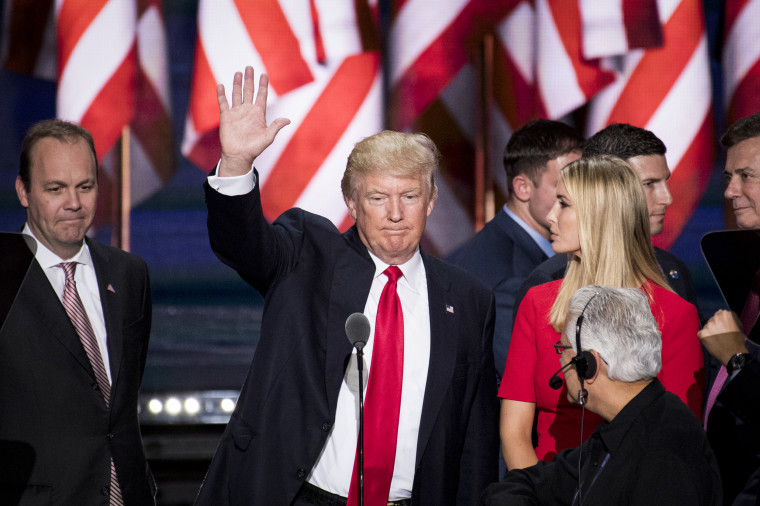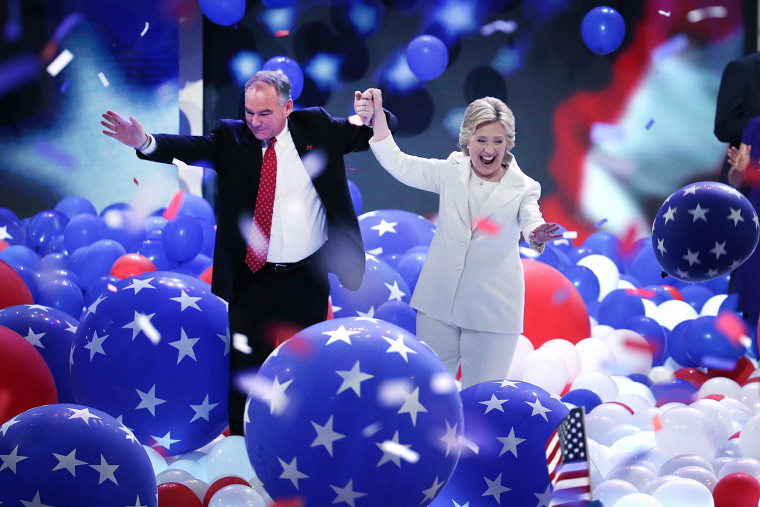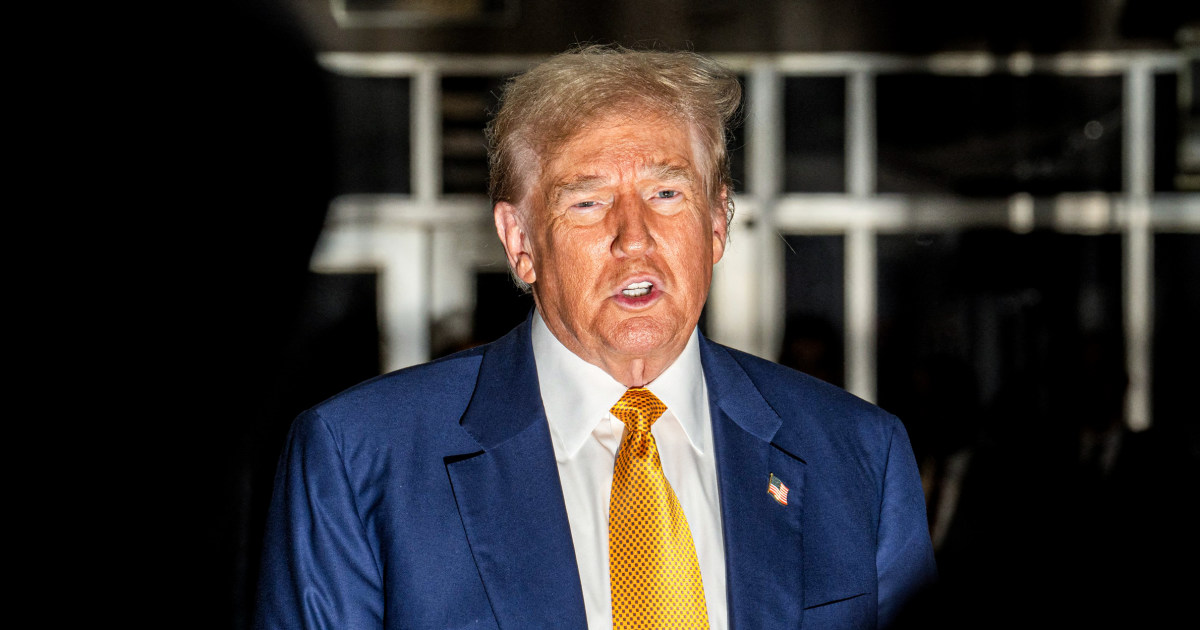The president of the progressive civil rights group Color of Change has a message for corporations that are considering participating in this summer’s Republican National Convention: Don’t even think about it.
Rashad Robinson said his group is preparing to launch a campaign against any company that announces a sponsorship of the coronation of Donald Trump as the Republican Party’s nominee in Milwaukee in July.
“I want to make it clear that this is something we are paying attention to,” said Robinson, who ran a similar pressure campaign against corporations in 2016. “If we see these companies moving in a different direction, we absolutely won’t let it go.”
Robinson’s threat underscores the danger for the normally risk-averse corporations that may be considering sponsoring this summer’s political conventions. In this polarized political climate, a company may decide that attaching its brand to either party may not offer enough gain to offset a public backlash.
NBC News interviewed more than 15 major corporate fundraisers and consultants with corporate clients. Many expressed concern over a charged political climate that they worry could backfire on their brand or where an investment would not pay off. Some said they feared being tied to Trump, given the litany of criminal charges against the former president. Others said the environment is too fragile, given the unrest exploding at college campuses across the country.
Out of the more than two dozen company representatives NBC News reached out to, only two — at AT&T and Fiserv Inc. — would confirm they had finalized plans to be involved in both the Republican and Democratic conventions this year.
AT&T said it would provide network connectivity for both events. Fiserv would only say that it plans to sponsor both conventions this year. The company holds the naming rights to Fiserv Forum, the arena where the RNC will be held.
“The 88 counts against former President Donald Trump, what we see today with college protests — all of it has made C-suites very reticent and very deliberate with how they want to engage, if at all,” said Greg Goldner, managing partner with Resolute Consulting, who represents numerous corporate clients and has a long history of working with conventions.
Trump and the baggage that comes with backing him was most often cited as a consideration by many of the corporate donors and consultants, indicative of Republicans’ struggle to reel in some of the major corporate sponsors that have traditionally been willing to back the GOP convention.
Some donors to previous Republican conventions over the last decade have yet to move ahead with any plans to support the GOP event in Milwaukee out of fear of a public outcry for backing Trump, according to four people familiar with the matter.
This reluctance, however, could hurt Democrats too. Major corporations often don’t want to seem like they’re taking one side politically, so they either sponsor both conventions, or neither.
“Corporations have this both-sides issue they have to put up with if they agree to sponsor a convention,” said a lobbyist who represents Fortune 500 companies in the tech, media and airline industries. The person added that “half” of their clients didn’t like “being associated with Trump,” although they wouldn’t name which clients those were.
Democrats seemed none too pleased with the prospect of losing out on corporate sponsors because of Trump.
“Organizations have a long-standing history supporting both parties’ nominating conventions because of the important role they play in our nation’s democratic process,” a source familiar with convention planning said. “Withholding support for both conventions because of Donald Trump’s extremism only emboldens Donald Trump.”
Sponsorship levels for both the Republican and Democratic conventions range from $100,000 to $5 million, according to the Milwaukee Journal Sentinel and a copy of the DNC funding levels obtained by NBC News.
Other consultants who have heard from Republicans and Democrats running the conventions said they see little business sense in sponsoring or funding the events because companies aren’t convinced they’ll see strong financial returns.
“I think the deal is there is less interest in the conventions because they are basically a big TV show. People are sort of like, ‘Do I want to pay extra to be on a TV show? What’s the value of this thing?’” said a lobbyist who has been pitched to have clients sponsor both conventions.
Conventions could see new sponsors
The Democratic and Republican conventions this summer are the first fully in-person conventions since the 2016 election.
The 2020 fight for the White House featured two virtual conventions due to the Covid-19 pandemic. Then-President Trump and candidate Joe Biden accepted their respective nominations away from the convention locations. At that time, many businesses that helped fund conventions didn’t participate, with attendance at historic lows.
The events this year are being pitched in private phone calls and meetings with corporate representatives as a chance to support a Republican convention, as well as its affiliated receptions, that will include new sponsors that may not have been featured at past events, according to a person familiar with the matter.
Another source noted that potential sponsors of the Republican convention are being pitched on the chance to promote their brand and meet with influential players, including politicians and media executives.
A lobbyist with clients in the oil and gas sector told NBC News that Trent Morse, the RNC’s chief of external affairs, briefed consultants and sister committees in March to inform them that “there’s been a significant push to get new sponsors.” Morse said the Republican convention is on pace to hit its financial goals, which include raising roughly $70 million, according to the source.
A representative for the Milwaukee 2024 Host Committee would not say which companies have agreed to take part in the convention. Instead, they touted their fundraising tally and said they’ve recruited new donors.
“The reality is we are $20 million ahead on fundraising compared to similar points in 2012 and 2016, because of the substantial support for our host committee’s efforts,” said Alison Prange, the chief operating officer of the host committee. “New donors are coming into the fold who did not give in 2016, and we’re especially proud of the tremendous support we’ve seen from Milwaukee and the rest of Wisconsin. We still have a little ways to go, but our fundraising continues to excel.”
A spokesman for the host committee referred NBC News to a Wall Street Journal feature on Trump’s former chief of staff Reince Priebus, who is the chairman of the host committee group and has taken the lead on fundraising and corporate sponsorships for the event.
A spokeswoman for the separate Republican National Committee did not return a request for comment.
Priebus told The Wall Street Journal that with Trump and Biden in a tight race, the convention has gotten a boost in interest from potential corporate sponsors. He noted, according to the paper, that almost all of the Fortune 500 companies based in Wisconsin have pledged financial support.
“Unlike 2016, I think people out there in the business world realize that the likelihood of President Trump being president is pretty high,” Priebus said. “It is going to be Trump or Biden, and those are the choices that America has, and not being a part of a convention if you have corporate interests, or you have community interests, it’s not really an option.”

There are eight Wisconsin-based companies listed by Fortune magazine as among the 500 largest U.S. businesses, including Fiserv. The Wall Street Journal reported that Northwestern Mutual, a Wisconsin Fortune 500 company, is among the donors to the Republican convention.
Three of the seven other Fortune 500 companies headquartered in Wisconsin confirmed to NBC News that they’re supporting the Republican convention this year, but they did not provide many details.
“As we did when the Democratic National Convention was in Milwaukee in 2020, the company is providing financial and facilities support — which is necessary for a host city to successfully stage a convention of this magnitude,” a spokesman for WEC Energy Group said. The company representative would not say how much “financial” support it’s providing the host committee. WEC Energy Group said it would provide “in-kind support through the use of our facilities near the convention.”
The two other companies, Fiserv and Manpower Group, would not say how much money, if any, they’ll give directly to the convention host committee or the Republican National Committee to help fund the convention.
“Fiserv has a commitment to corporate non-partisanship, and in 2024 will sponsor both the Republican and Democratic National Conventions,” said a company spokeswoman, while later adding that the company has a sponsorship deal with the Milwaukee 2024 Host Committee.
A representative for Manpower Group told NBC News the company is supporting the convention through donations to the Metropolitan Milwaukee Association of Commerce.
“We have not directly provided funds to the RNC, but rather MMAC has provided funds on our and others’ behalf, just like they did for the DNC [Democratic National Convention],” a Manpower Group spokeswoman said.
Protests could discourage corporate support
Democrats likewise would not disclose the sponsors the DNC has so far locked down. But two sources on calls involving Democratic convention planning said there has already been talk of a strong labor presence among the donors and that discussions continue with other heavy hitters.
“The corporate community, organized labor, and allied groups are invested in the success of this summer’s Democratic National Convention because a well-executed convention is a win for the city of Chicago,” Natalie Edelstein, spokesperson for the Chicago 2024 Host Committee, said in a statement.
Democrats are working to raise the host committee goal of more than $80 million for the convention in Chicago. Longtime Democratic donor and Chicago host committee leader Michael Sacks is behind some of the pitches, according to a lobbyist who has heard from the veteran businessman. Sacks, who is close with Illinois Gov. J.B. Pritzker and a veteran supporter of former President Barack Obama, is known for his deep connections among donors and businesses.
Democratic convention organizers in April said if corporations had any reluctance to back the RNC, it hasn’t hampered Chicago’s efforts to lure donors.
“This committee has seen a really strong response to all of their efforts when it comes to fundraising, engagement, volunteerism,” said Alex Hornbrook, executive director of the Democratic convention. Those efforts, he said, “exceeded every mark that we set so far. … We feel very confident in where we are.”
There’s also the concern about protests at both of the convention sites, and some companies don’t want their brands connected to them.
“Neither one of these are Taylor Swift concerts,” quipped another lobbyist about what she expects to be a lack of corporate support and attendance at the conventions based on conversations she’s had as recently as the White House Correspondents’ Association Dinner in late April.
The hunt for convention sponsors
Nearly all of the two dozen companies NBC News reached out to have given at least $15,000 in cash or in-kind contributions to conventions since 2012, when Mitt Romney and Obama duked it out for the presidency, according to Federal Election Commission records.
At least half a dozen of those companies — such as Facebook, Google, Microsoft, Bank of America, AT&T and Anthem (now known as Elevance Health) — are among the top corporate donors that gave at least $500,000 in contributions or in-kind services to both the Democratic and Republican conventions in 2016, according to FEC records.
Some of those same corporations don’t have immediate plans to fund or participate in the conventions this year.
“Microsoft is assessing a presence at both conventions this summer,” a company spokesman said in a one-line statement to NBC News. Facebook and its parent company Meta are not expected to participate through either donations or a sponsorship opportunity at the conventions, according to consultants familiar with the matter. The company declined to provide a comment for this story.
Press representatives from Google and Bank of America declined to comment when reached.
If the tech companies decide to dial back their involvement in this year’s conventions, it will be a noticeable shift. At past events, swag with branding from companies like Google and Facebook was everywhere. In 2012, Google used shipping containers to build a whole new pop-up facility, where there were areas for people to hang out, livestream and be bombarded with Google services and products.
Microsoft in 2012 contributed over $1.5 million in a mix of in-kind and cash contributions to the Republican convention. But in 2016, it did not provide a cash donation and gave over $1.8 million in in-kind technology services, according to FEC records. Microsoft’s services during the 2016 conventions featured lounge and reception spaces, the promotion and use of Skype, and providing attendees access to other products.
Google gave $500,000 in 2016 to support the Republican convention, according to campaign finance records.

Beyond Facebook’s over $1 million in support of both events, the company showed off its then-new product, Facebook Live, to livestream the Republican and Democratic conventions.
The deliberations by some tech giants whether to take part in the conventions comes after the relationship between Republican officials and many in the industry has grown more tense.
Trump has taken particular aim at Facebook, calling it the “enemy of the people” in a March interview on CNBC. Google has been under past scrutiny by Trump’s allies in Congress.
JPMorgan Chase and Walmart are two companies that have no plans to fund or sponsor the conventions, according to their respective press teams.
Walmart ended up giving $15,000 to the Republican convention in 2016, a drop from $150,000 four years earlier, according to FEC records. JPMorgan donated $200,000 to the 2012 Republican convention and didn’t write a check for the 2016 event.
General Motors could have a presence on the ground at the conventions, including having its vehicles drive featured speakers to the convention centers, according to a person familiar with the matter. But a spokeswoman for General Motors said “our plans for support of the conventions have not been finalized at this time.”
General Motors backed both the Republican and Democratic conventions in 2016, according to FEC records.
Comcast, the parent company of NBCUniversal, spent millions on the Democratic convention in 2016, when the event was in Philadelphia, where the company has its headquarters. Most of those funds were for in-kind services. Press representatives for Comcast did not return a request for comment.
Trade group sponsorship route
Other corporate advisers said companies have looked for alternative, and less visible, ways to support the conventions amid concerns about safety. Organizers for both the RNC and DNC are contending with the prospect of substantial protests in light of the ongoing Israel-Hamas war.
“To date, none of our corporate donors to the host committee have withdrawn support from the Democratic National Convention because of concerns related to protesting,” a host committee official familiar with fundraising said.
One option that’s been pushed is to donate to a desired trade group or a similar 501(c)(6) intending to take part at the meetings this summer. These types of groups act as state and federal lobbying forces for industries that want to influence policy.
Those organizations often do not publicly disclose their donors and would allow companies to have a role at the conventions from a distance.
The oil and gas industry already has at least one such nonprofit planning to attend both events: the American Petroleum Institute, according to the nonprofit’s spokesman. The trade group receives lobbying funds from oil and gas giant ExxonMobil, according to the company. API spent around $2 million on federal lobbying during the first quarter, according to disclosure reports.
Though API did not say if it was donating to the conventions, the group has given millions of dollars to both the Democratic and Republican conventions since 2012, according to FEC records.
“Everyone is just kind of trying to understand ‘how do I get the impact … with minimal risk to our brand’ — both employees and customers,” Resolute’s Goldner said. “It’s an open question.”
